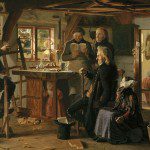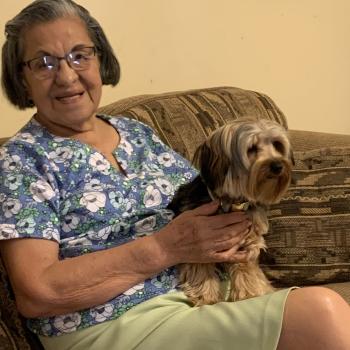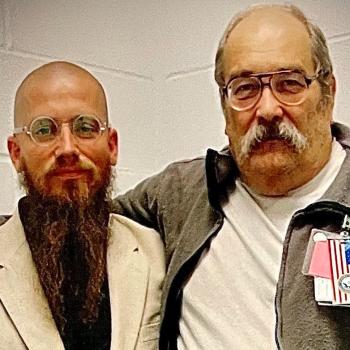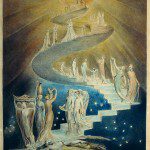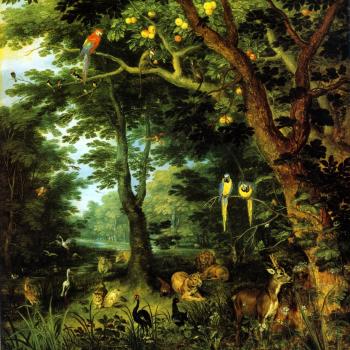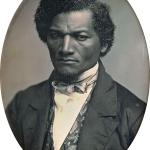
Note the heavenly reunions depicted in the mural on the wall.
I’ve recently shared three or four passages here with you from Hadley Vlahos, The In-Between: Unforgettable Encounters During Life’s Final Moments (New York: Ballantine Books, 2023). Here’s another one that I really liked, and that I think you might find interesting, as well:
I’ve seen just as many patients who aren’t religious and don’t believe in an afterlife have end-of-life visitations from loved ones as I have those who do believe in a life after this one. Having said that, I don’t think that we can explain everything that happens here on Earth, much less what ever comes after we physically leave our bodies. I do believe that our loved ones come to get us when we pass, and I don’t believe that’s the result of a chemical reaction in our brain in those final hours. There’s a big difference between hallucinations and the sort of visitations described in this book — I’ve seen them both, and they’re not the same. While hallucinations can be anything from spiders on the wall to the house morphing around you, visitations are lucid and matter-of-fact to the patient who’s describing them. While hallucinations can incite anxiety or fear, visitations bring with them a sense of calm and peace. (250)
At the very end of her book, Ms. Vlahos, who is a registered nurse and a specialist in hospice care, addresses the patients whom she treated at the end of their lives. One of them was an outspokenly atheistic patient that she calls “Frank,” who, along with his wife, wanted no “religion” brought into his passing. Nonetheless, at the end, he said, his sister was visiting and conversing with him. And, when his wife bluntly reminded him that his sister was dead, he brushed the objection aside and remarked that his sister was nobody of whom anyone needed to be afraid (233-235). To him, Ms. Vlahos writes,
Your unwavering belief in, well, no beliefs has allowed me to better understand and explain to others that no matter what your beliefs — or lack thereof — your loved ones will still come to get you. (258)
I couldn’t help but be reminded in this connection of a passage from the text of one of the lectures contained in Elisabeth Kübler-Ross, On Life after Death (Berkeley and Toronto: Celestial Arts, 2008). Dr. Kübler-Ross, who died herself some years ago, was a Swiss-born physician and psychiatrist who became very famous for her revolutionary work with dying patients, particularly through a hugely influential 1969 book entitled On Death and Dying. This passage is, though, as I say, from On Life after Death:
At the moment of this transition, you are never, ever alone. You are never alone now, but you don’t know it. But at the time of transition, your guides, your guardian angels, people whom you have loved and who have passed on before you, will be there to help you. We have verified this beyond a shadow of a doubt, and I say this as a scientist. There will always be someone to help you with this transition. Most of the time it is a mother or father, a grandparent, or a child if you have lost a child. Sometimes it is people you didn’t know were “on the other side” already.
We had one case of a child, a twelve year old, who did not want to share with her mother what a beautiful experience it was when she died. No mother likes to hear that her child found a place nicer than home, and that’s very understandable. But this child had such a unique experience that she needed desperately to share it with somebody, so one day she confided in her father. She told him that it was such a beautiful experience when she died that she did not want to come back. What made it very special, besides the whole atmosphere and the fantastic love and light that most of them convey, was that her brother was there with her, and held her with great tenderness, love, and compassion. After sharing this she said to her father, “The only problem is that I don’t have a brother.” Her father started to cry, and confessed that she did indeed have a brother who died three months before she was born. They had never told her.
Do you understand why I am bringing up examples like this? Many people will say, “Well, you know, they were not dead, and at the moment of their dying they naturally think of their loved ones, so they naturally visualize them.” But nobody could visualize a brother they never knew about. (27-28)
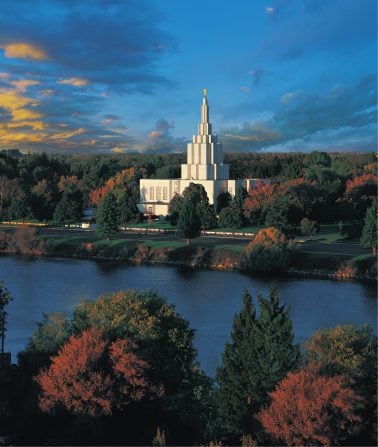
(LDS Media Library). One of the most powerful intimations that I’ve ever experienced both of a dimly perceived or intuited and almost ineffable holiness as well as, very specifically, of the reality of life after death came to me during an evening visit to the grounds of this temple. It occurred when I was in my early to mid-teens. I said nothing about it to anybody at the time, but I’ve never forgotten it. I still remember the impression that came over me (and the image that occasioned that impression) very distinctly, and I think of it whenever I visit the temple in Idaho Falls.
Here are two stanzas of a hymn that, candidly, I long hated as too treacly, too corny, too sentimental. I don’t feel that way anymore:
Oh, what songs of the heart
We shall sing all the day,
When again we assemble at home,
When we meet ne’er to part
With the blest o’er the way,
There no more from our loved ones to roam!
When we meet ne’er to part,
Oh, what songs of the heart
We shall sing in our beautiful home.Tho our rapture and bliss
There’s no song can express,
We will shout, we will sing o’er and o’er,
As we greet with a kiss,
And with joy we caress
All our loved ones that passed on before;
As we greet with a kiss,
In our rapture and bliss,
All our loved ones that passed on before.



